In the vast and complex world of intellectual property, understanding the terminology is key to navigating the legal landscape. One term that often comes up in discussions and disputes is “injunction.” In this article, we will provide a comprehensive overview of intellectual property terminology, with a particular focus on injunctions.
Understanding Intellectual Property: A Brief Overview
Before delving into the details of injunctions, it is important to have a basic understanding of intellectual property. Intellectual property refers to the legal rights granted to individuals or organizations for their creations or inventions. These creations can be tangible, such as a product or artwork, or intangible, such as a process or idea. Intellectual property law is designed to protect these rights and ensure that innovators are rewarded for their efforts.
Intellectual property can be categorized into three main areas: patents, trademarks, and copyrights. Each of these areas provides different types of protection and covers various aspects of intellectual creation.
Defining Intellectual Property
Intellectual property encompasses a wide range of creations, including inventions, literary and artistic works, symbols, names, images, and designs used in commerce. It is intangible property that is protected by law.
When we talk about inventions, we often think of groundbreaking technological advancements that shape our lives. However, intellectual property goes beyond just technological innovations. It also includes literary and artistic works, such as novels, poems, paintings, and sculptures. These creative expressions are protected by copyright, which grants the creator exclusive rights to reproduce, distribute, and display their work.
In addition to inventions and artistic works, intellectual property also covers symbols, names, images, and designs used in commerce. These are protected by trademarks, which prevent others from using similar marks that may cause confusion in the marketplace. Trademarks play a crucial role in branding and marketing, as they help consumers identify the source of a particular product or service.
The Importance of Intellectual Property
Intellectual property serves as the foundation for innovation and creativity in society. By providing legal protection and incentive to creators, intellectual property rights foster an environment where individuals and organizations can invest time, money, and resources into developing new and groundbreaking ideas.
Imagine a world without intellectual property rights. In such a scenario, creators would have no assurance that their efforts would be rewarded. This lack of protection could discourage individuals from investing their time and resources into developing new inventions or creating original works of art. The absence of intellectual property rights could stifle innovation and hinder progress in various fields.
Moreover, intellectual property rights help drive economic growth, as they allow businesses to monetize their inventions and creations. When individuals and organizations have exclusive rights to their intellectual property, they can license or sell these rights to others, creating opportunities for collaboration and generating revenue. This economic incentive encourages investment in research and development, leading to the creation of new products and technologies that benefit society as a whole.
In-Depth Look at Injunctions
Now, let’s dive deeper into the concept of injunctions and how they relate to intellectual property. In its essence, an injunction is a court order that prohibits someone from taking certain actions or requires them to fulfill specific obligations. In the context of intellectual property, an injunction can play a crucial role in protecting the rights of the IP owner.
An injunction is a legal remedy sought by an IP owner when their rights are being violated or threatened. It is a powerful tool that allows the IP owner to halt infringing activities or prevent potential ones from occurring. Injunctions can be sought both as a preliminary measure during ongoing litigation or as a final remedy following a successful infringement claim.
When seeking an injunction, the IP owner must demonstrate that they have a valid intellectual property right and that it is being infringed or is at risk of being infringed. They must also prove that granting the injunction is necessary to prevent irreparable harm and that the balance of convenience lies in their favor. The courts carefully evaluate these factors and make a decision based on the merits of each case.
What is an Injunction?
An injunction is a court order that can be sought by an IP owner to protect their intellectual property rights. It acts as a legal remedy to prevent or stop infringing activities. By obtaining an injunction, the IP owner can effectively enforce their rights and maintain control over their intellectual property.
When an IP owner seeks an injunction, they must provide evidence to the court that their intellectual property rights are being violated or are at risk of being violated. This evidence can include documentation of the infringement, such as copies of infringing materials, witness statements, or expert opinions.
Once the court grants an injunction, it becomes legally binding on the parties involved. The party against whom the injunction is granted must comply with the court’s order and refrain from engaging in the prohibited activities. Failure to comply with an injunction can result in severe consequences, including fines or even imprisonment.
Different Types of Injunctions
In intellectual property cases, there are different types of injunctions that can be sought depending on the circumstances. Temporary injunctions, also known as preliminary injunctions, are sought when immediate relief is needed to prevent further harm. These injunctions are usually granted while the case is still ongoing and aim to maintain the status quo until a final judgment is reached.
On the other hand, permanent injunctions are sought as a final remedy following a successful infringement claim. These injunctions are intended to permanently prohibit the infringing activities and ensure that the IP owner’s rights are protected in the long term.
Additionally, there are mandatory injunctions and prohibitory injunctions. A mandatory injunction requires the party against whom it is granted to take certain actions, such as ceasing infringing activities or delivering infringing materials. A prohibitory injunction, on the other hand, prohibits the party from engaging in specific activities.
How Injunctions Work in Intellectual Property Cases
When an IP owner seeks an injunction in an intellectual property case, the court carefully evaluates various factors before making a decision. One crucial factor is whether the IP owner has a valid intellectual property right that is being infringed or is at risk of being infringed.
The court also considers whether granting the injunction is necessary to prevent irreparable harm to the IP owner. Irreparable harm refers to damages that cannot be adequately compensated through monetary means. The court weighs the potential harm to the IP owner against any potential harm that the injunction may cause to the party against whom it is sought.
Furthermore, the balance of convenience is another factor that the court takes into account. This refers to the overall benefit or disadvantage that would result from granting or denying the injunction. The court considers factors such as the impact on the parties involved, the public interest, and the potential for future litigation.
Overall, injunctions in intellectual property cases serve as a crucial tool for IP owners to protect their rights. By seeking an injunction, they can effectively enforce their intellectual property rights and prevent further harm or potential infringement. The court’s decision to grant or deny an injunction is based on a careful evaluation of the merits of each case, ensuring a fair and just resolution.
Other Key Intellectual Property Terms
While injunctions play a significant role in protecting intellectual property rights, it is essential to understand other key terms in this field. Let’s explore some of them.
Patent: Definition and Importance
A patent is a legal right granted to an inventor or assignee for a new and useful invention. It gives the patent holder the exclusive right to use, manufacture, and sell their invention for a fixed period, usually 20 years. Patents serve as a powerful tool for encouraging innovation and protecting inventive ideas.
Trademark: Understanding its Role
A trademark is a distinctive sign, symbol, or logo used to identify and distinguish the goods or services of one business from those of others. Trademarks can be words, slogans, designs, or a combination of these, and they play a crucial role in brand recognition and consumer trust.
Copyright: What it Protects
Copyright grants the creator of an original work, such as a book, music, or artwork, exclusive rights to use and distribute that work. It safeguards the expression of ideas rather than the ideas themselves. Copyright protection lasts for the author’s lifetime plus a certain number of years, promoting creativity and encouraging the sharing of artistic works.
The Role of Injunctions in Intellectual Property Disputes
Now that we have covered the various intellectual property terms, let’s explore how injunctions are utilized in real-world disputes.
Case Studies of Injunctions in IP Disputes
There have been numerous instances where injunctions played a critical role in protecting intellectual property rights. For example, in a high-profile patent infringement case, a court granted a permanent injunction, barring a company from manufacturing or selling a product that infringed on a patented technology.
The Impact of Injunctions on Businesses
Injunctions can have a profound impact on businesses, both for the IP owners and the alleged infringers. For IP owners, the ability to obtain an injunction can be crucial in preserving the value and market share of their innovations. On the other hand, for alleged infringers, the issuance of an injunction can lead to significant financial losses and damage to their reputation.
Navigating Intellectual Property Law: Tips and Advice
Now that you have a solid understanding of intellectual property terminology, including injunctions, here are some tips to help you navigate the legal aspects of this field.
When to Seek an Injunction
If you believe your intellectual property rights are being violated or are at risk, it is important to consult with a legal professional experienced in intellectual property law. They can assess the situation and advise you on the appropriate course of action, including whether seeking an injunction is necessary and beneficial.
How to Protect Your Intellectual Property Rights
Ensure that your intellectual property is adequately protected by registering trademarks, patents, or copyrights, depending on the nature of your creation. Implement internal processes to safeguard your intellectual property and be proactive in monitoring and identifying any infringement attempts.
Seeking Legal Advice for Intellectual Property Issues
Intellectual property matters can be intricate and nuanced. To ensure that your rights are protected and to navigate any legal challenges effectively, seek the guidance of an experienced intellectual property attorney. They can provide tailored advice, handle negotiations, and represent you in intellectual property disputes.
By building your knowledge of intellectual property terminology and understanding how injunctions function within this framework, you will be better equipped to protect your creations and navigate the complexities of intellectual property law. Remember, seeking specialist legal advice is crucial to ensure your intellectual property rights are safeguarded and enforced.











